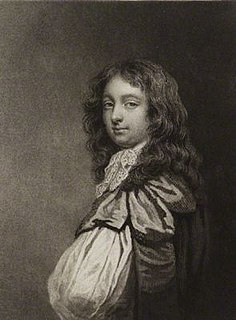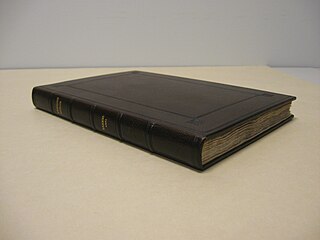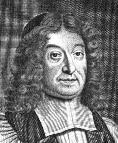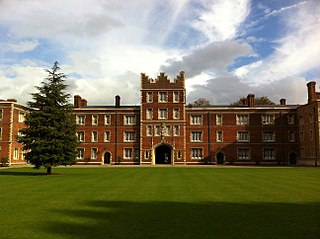The 1690s BC was a decade lasting from January 1, 1699 BC to December 31, 1690 BC.

John Dryden was an English poet, literary critic, translator, and playwright who was made England's first Poet Laureate in 1668.
This article presents lists of the literary events and publications in 1700.
This article presents lists of the literary events and publications in 1698.

Robert Herrick was a 17th-century English lyric poet and cleric. He is best known for Hesperides, a book of poems. This includes the carpe diem poem "To the Virgins, to Make Much of Time", with the first line "Gather ye rosebuds while ye may".

Charles Spencer, 3rd Earl of Sunderland, KG, PC, known as Lord Spencer from 1688 to 1702, was an English statesman and nobleman from the Spencer family. He served as Lord Lieutenant of Ireland (1714–1717), Lord Privy Seal (1715–1716), Lord President of the Council (1717–1719) and First Lord of the Treasury (1718–1721).

Duke of Cleveland is a title that has been created twice, once in the Peerage of England and once in the Peerage of the United Kingdom. The dukedoms were named after Cleveland in northern England.
Samuel Penhallow was a Cornish colonist and historian and militia leader in present-day Maine during Queen Anne's War and Father Rale's War. He was the commander at Fort Menaskoux and was attacked during the Northeast Coast Campaign (1724).

Ford Grey, 1st Earl of Tankerville, 1st Viscount Glendale, and 3rd Baron Grey of Werke, was an English nobleman and statesman.

Arthur Henry Bullen, often known as A. H. Bullen, was an English editor and publisher, a specialist in 16th and 17th century literature, and founder of the Shakespeare Head Press, which for its first decades was a publisher of fine editions in the tradition of the Kelmscott Press.

Thomas Newport, 1st Baron Torrington, styled The Honourable from 1675 until 1716, was an English barrister and Whig politician who sat in the English and British House of Commons between 1695 and 1716 when he was raised to the peerage as Baron Torrington.
Nationality words link to articles with information on the nation's poetry or literature.
Nationality words link to articles with information on the nation's poetry or literature.
George Gore (1675-1753) was an Irish landowner and judge: he held office as Attorney General for Ireland and later served as. a justice of the Court of Common Pleas (Ireland). Despite his vigorous efforts, he failed to gain further promotion, but his second son John, Lord Annaly, became Lord Chief Justice of Ireland.

Drexel 4041 is a 17th-century British music manuscript commonplace book. As described by musicologist John P. Cutts, Drexel 4041 "is a treasure-house of early seventeenth-century song and dramatic lyric worthy of the attention of any student of seventeenth-century literature and drama." It is also a major source for the work of English composer William Lawes. Belonging to the New York Public Library, it forms part of the Drexel Collection, housed in the Music Division of the New York Public Library for the Performing Arts. Following traditional library practice, its name is derived from its call number.
Abraham Holland was an English poet. He was the son of the translator, Philemon Holland, and the brother of the printer, Henry Holland. His best known work is the Naumachia, a poem on the Battle of Lepanto in 1571.
John Burton was Archdeacon of Cleveland from his installation on 23 July 1685 until his death on 124 November 1700.
The public domain consists of all the creative work to which no exclusive intellectual property rights apply. Those rights may have expired, been forfeited, expressly waived, or may be inapplicable.

Sir Sidney Lee was an English biographer, writer and critic.

The Dictionary of National Biography (DNB) is a standard work of reference on notable figures from British history, published since 1885. The updated Oxford Dictionary of National Biography (ODNB) was published on 23 September 2004 in 60 volumes and online, with 50,113 biographical articles covering 54,922 lives.















